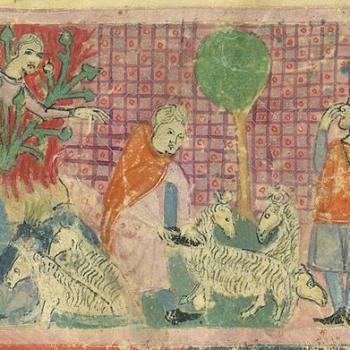Free to Dream, Dream to Free
Biblical myth masters tell us that the Exodus began with a man who had a dream. He was a man by the name of Nun, a Hebrew slave under Egyptian rule. One morning he awoke, stunned by his night imaginings. He had dreamed what seemed to be the unimaginable. He saw a time when the Hebrews were free! More than free, they were warriors responsible for the dignity of their own destiny. News of the dream spread. It is said that the hope enflamed by this vision unleashed the dynamics of revolution, which ultimately led to freedom.
Although it would take many years for it to become real in the world of realpolitik, this was the true beginning of the Exodus. Slavery ends when we can re-imagine ourselves as free men. Nun is no one other than the father of Joshua, successor to Moses, who led the people into the Promised Land. All freedom begins with our willingness to stand and say, "I have a Dream!" And even if we don't get to the Promised Land, we may well set into motion currents of redemption that will eventually heal our world. If we don't get there, our children will. Nun's entire generation died out before reaching Canaan. Yet all of his grandchildren grew up in the Promised Land.
Prophet of imagination Nikos Kazantzakis writes, "You have your brush and your colors, paint paradise and in you go." This is a near perfect description of the spirit animating the biblical myth ritual that yearly celebrates the Exodus from Egypt. Every year on the anniversary of the Hebrew Exodus, which is celebrated this week in the Jewish holiday of Passover, people gather for a uniquely dramatic biblical myth ritual, Passover. Unlike the Fourth of July or other freedom anniversaries, it revolves not around commemoration, but imagination.
The guiding principle of the holiday—"Every person is obligated to see him/herself as if they left Egypt." This talmudic epigram, the guiding mantra of the ritual, is unpacked by the Kabbalists as an invitation to personal re-imagining of the most fantastic kind. You are in Egypt, your own personal Egypt. Egypt, in Hebrew literally means 'the narrow places,' the constricted passageway of our life's flow. Egypt—kabbalistically said to incarnate the throat—symbolizes all the words that remain stuck there, the words we never speak. The stories of our lives that remain unlived, unsung, unimagined.
We are slaves. Slavery for the kabbalist is primarily a crisis of imagination. Consequently, the healing of slavery is a ritual of imagination. For an entire evening, we become dramatists, choreographers, and inspired actors. We re-imagine our lives as the first step on our path to freedom. As George Bernard Shaw reminds us, ". . . Imagination is the beginning of creation. You imagine what you desire; you will what you imagine; and at last you create what you will."
Divine Imagination
God is the possibility of possibility—limitless imagination. The first of the Ten Commandments is "I am God." When this God is asked to identify himself, he responds, "I will be what I will be." That is, "You cannot capture me in the frozen image of any time or place. To do so would be to destroy me." It would be to violate the second commandment against idolatry.
Idolatry is the freezing of God in a static image. To freeze God in an image is to violate the invitation of the imagination. It is to limit possibility.
In-Fancy
Children who play in fountains are the guardians of the imagination. They know of the gibberish and flow quality of words, qualities nourished by the imagination. Almost all children at some point write poetry until someone tells them their poems are not good enough or not serious enough. Then they become adults.
My niece just shared with me a new book of poetry written by 11-year-old Mattie Stepanek. Mattie has a rare and fatal form of muscular dystrophy. He is not the first in his family to have it. Each one of his three brothers and sisters before him has had it, and each one has died of it. His mother, too, has found out that she shares the disease. Mattie is an ambassador from the world of childhood as well as from the world of pain. The following poem is called "Faces of Faith":
Everyone is born with a Heartsong,
But as we grow up,
Sometimes we forget about it,
Because we don't listen to it enough.
And the people of war, well,
They really need to get them back.
Their Heartsongs really need to live,
Because when we die,
They are what rise up . . .
I will remember to listen to my Heartsong.
I will remind others, especially the grown-ups,
To listen to their Heartsongs, too.
And for the people who have forgotten theirs,
I will share mine with them.
We seek to save our children, to protect them from what psychology has termed the "magical thinking" of their imaginings. Yet, perhaps they are the ones saving us, protecting us, from our "rational thinking" and lack of imagining—sharing with us their Heartsongs.




